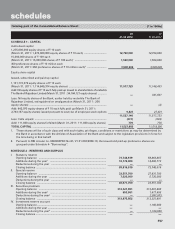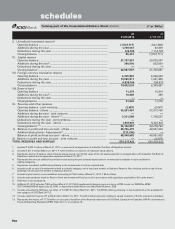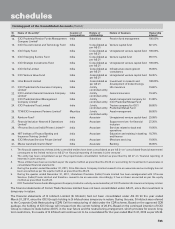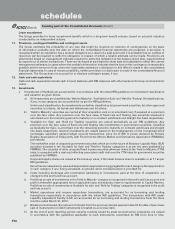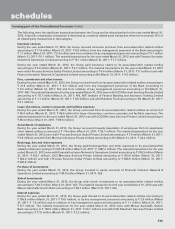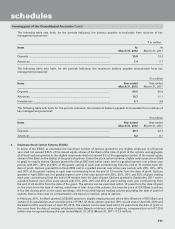ICICI Bank 2012 Annual Report Download - page 145
Download and view the complete annual report
Please find page 145 of the 2012 ICICI Bank annual report below. You can navigate through the pages in the report by either clicking on the pages listed below, or by using the keyword search tool below to find specific information within the annual report.
F67
xIncome from brokerage activities is recognised as income on the trade date of the transaction. Brokerage income in
relation to public or other issuances of securities is recognised based on mobilisation and terms of agreement with
the client.
xLife insurance premium is recognised as income when due. Premium on lapsed policies is recognised as income
when such policies are reinstated. Top-up premiums are considered as single premium. For linked business,
premium is recognised when the associated units are created. Income from linked funds, which includes fund
management charges, policy administration charges, mortality charges etc. are recovered from the linked fund in
accordance with the terms and conditions of the policy and are recognised when due.
xIn the case of general insurance business, premium is recorded for the policy period at the commencement of risk
and for instalment cases, it is recorded on instalment due dates. Premium earned is recognised as income over
the period of risk or the contract period based on 1/365 method, whichever is appropriate, on a gross basis, net
of service tax. Any subsequent revision to premium is recognised over the remaining period of risk or contract
period. Adjustments to premium income arising on cancellation of policies are recognised in the period in which
the policies are cancelled. Commission on re-insurance ceded is recognised as income in the period of ceding the
risk. Profit commission under re-insurance treaties, wherever applicable, is recognised as income in the period of
final determination of profits and combined with commission on reinsurance ceded.
xIn the case of general insurance business, insurance premium on ceding of the risk is recognised in the period in
which the risk commences. Any subsequent revision to premium ceded is recognised in the period of such revision.
Adjustment to re-insurance premium arising on cancellation of policies is recognised in the period in which it is
cancelled. In case of life insurance business, cost of reinsurance ceded is accounted for at the time of recognition
of premium income in accordance with the treaty or in-principle arrangement with the reinsurer. Profit commission
on reinsurance ceded is netted off against premium ceded on reinsurance.
xIn the case of general insurance business, premium deficiency is recognised when the sum of expected claim costs
and related expenses exceed the reserve for unexpired risks and is computed at a business segment level.
3. Stock based compensation
The following entities within the group have granted stock options to their employees:
xICICI Bank Limited
xICICI Prudential Life Insurance Company Limited
xICICI Lombard General Insurance Company Limited
xICICI Venture Funds Management Company Limited
The Employees Stock Option Scheme (the Scheme) provides for grant of equity shares of the Bank to wholetime
directors and employees of the Bank and its subsidiaries. The Scheme provides that employees are granted options to
subscribe to equity shares of the Bank that vest in a graded manner. The options may be exercised within a specified
period. ICICI Prudential Life Insurance Company and ICICI Lombard General Insurance Company have also formulated
similar stock option schemes for their employees for grant of equity shares of their respective companies.
The Group follows the intrinsic value method to account for its stock-based employee compensation plans. Compensation
cost is measured as the excess, if any, of the fair market price of the underlying stock over the exercise price on the grant
date. The fair market price is the latest closing price, immediately prior to the grant date, which is generally the date of
the Board of Directors meeting in which the options are granted, on the stock exchange on which the shares of the Bank
are listed. If the shares are listed on more than one stock exchange, then the stock exchange where there is highest
trading volume on the said date is considered. The banking subsidiaries namely, ICICI Bank UK and ICICI Bank Canada
account for the cost of the options granted to employees by ICICI Bank using the fair value method based on binomial
tree model. In the case of ICICI Prudential Life Insurance Company and ICICI Lombard General Insurance Company, the
fair value of the shares is determined based on an external valuation report.
The Group’s venture capital subsidiary i.e. ICICI Venture Funds Management Company has settled carried interest trusts
for the benefit of its employees. These trusts have investment in a separate class of units of certain fully consolidated
funds. These carried interest entitlements are treated as employee compensation and are accounted for at the time of
distribution of such carried interest to the trusts.
4. Income taxes
Income tax expense is the aggregate amount of current tax and deferred tax expense incurred by the Group. The current
tax expense and deferred tax expense is determined in accordance with the provisions of the Income Tax Act, 1961
and as per AS 22 on ‘accounting for taxes on income’ issued by ICAI, respectively. Deferred tax adjustments comprise
changes in the deferred tax assets or liabilities during the year.
Deferred tax assets and liabilities are recognised on a prudent basis for the future tax consequences of timing differences
arising between the carrying value of assets and liabilities and their respective tax basis and carry forward losses.
Deferred tax assets and liabilities are measured using tax rates and tax laws that have been enacted or substantively
enacted at the balance sheet date. The impact of changes in the deferred tax assets and liabilities is recognised in the
profit and loss account.
forming part of the Consolidated Accounts (Contd.)
schedules


